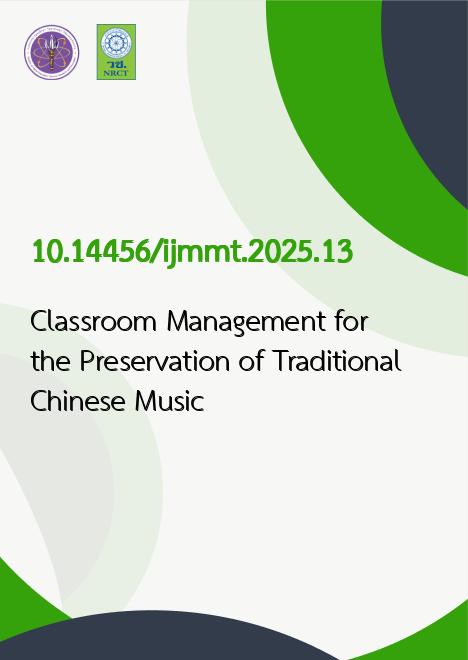
|
Classroom Management for the Preservation of Traditional Chinese Music |
|---|---|
| รหัสดีโอไอ | |
| Creator | Huang Zhiqing |
| Title | Classroom Management for the Preservation of Traditional Chinese Music |
| Contributor | Rujee Srisombat, Sinam Klaywong |
| Publisher | Banndamnoen Press |
| Publication Year | 2568 |
| Journal Title | International Journal of Multidisciplinary in Management and Tourism |
| Journal Vol. | 9 |
| Journal No. | 2 |
| Page no. | 197-210 |
| Keyword | Classroom Management, Preservation of Culture, Jiangxifolk music |
| URL Website | https://so03.tci-thaijo.org/index.php/ijmmt |
| Website title | https://so03.tci-thaijo.org/index.php/ijmmt |
| ISSN | 2730-3306 |
| Abstract | This article aimed to explore classroom management for the preservation of traditional Chinese music. The researcher conducted the study using qualitative research methodology. Research instruments included expert interviews in the field of music and classroom observation. The findings were used to design and implement a classroom management plan to promote cultural knowledge through Jiangxi folk music. The research participants consisted of a music teacher at No. 1 High School and a sample group of 30 junior secondary students. Through the study of folk songs for use in compulsory music education, the researcher identified four suitable Jiangxi folk songs: The Sun is Red on Jinggang Mountain, Ying Shan Hong, Song of Invitation to Tea, and Ten Farewells to the Red Army. These songs share a contrafactum structure—repeating the same melody while varying the lyrics. They are primarily composed in B♭ Major and A Major and use 2/4 and 3/4 time signatures. The lyrics reflect themes of patriotism, revolution, nature, and local traditions, serving as a musical archive of Jiangxi's cultural heritage. Instructional materials were developed to bridge theory and practice, including pitch modulation exercises and rhythm-counting aids. Classroom activities—such as essay writing, cultural discussions, mini-exhibitions, and simulated tour guide projects—enhanced students’ understanding and appreciation of folk traditions. A comprehensive classroom management approach was applied across four key areas: environment, behavior, discipline, and motivation. This included creating interactive displays, encouraging collaborative learning, assigning clear group responsibilities, and using thought-provoking questions to stimulate critical thinking. The study found that integrating Jiangxi folk songs into music education not only enriched students' cultural knowledge but also promoted active and positive learning engagement. It concludes that integrating traditional folk music culture into classroom management through Jiangxi folk songs significantly enhances cultural understanding and contributes to the preservation of Chinese folk music traditions. |